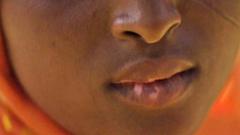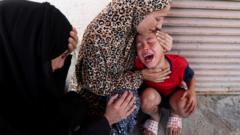In Nigeria, the use of skin-whitening creams has risen dramatically, affecting the health and social standing of many, including children. A mother's regret highlights the dangers of these products, as cultural pressures lead to irreversible skin damage and stigmatization for her family.
The Harrowing Impact of Skin-Whitening Products on Nigerian Children

The Harrowing Impact of Skin-Whitening Products on Nigerian Children
A mother recounts the damaging effects of skin-lightening creams on her children, as Nigeria grapples with the cultural pressure to conform to beauty standards.
In the bustling city of Kano, a mother known as Fatima, aged 32, holds her two-year-old child tightly, mourning the physical scars left by skin-whitening creams she applied to all six of her children. Under familial pressure to achieve lighter skin, Fatima's decision has resulted in painful burns and discolored patches on her children's skin—effects she now deeply regrets. Her oldest daughter obscures her face in public, ashamed of her injuries, while others suffer from unsightly scars and darker patches surrounding lighter areas.
Fatima's experience reflects a troubling trend in Nigeria, where the practice of bleaching one's skin has cultural implications tied to perceived beauty and status. The World Health Organization estimates that around 77% of Nigerian women use skin-lightening products, a disturbing statistic that far exceeds rates in other African nations. Fatima explains that her family's favoritism towards lighter-skinned relatives fueled her decision, compulsively seeking acceptance through dangerous means.
The cosmetics employed often contain harmful substances, such as mercury and hydroquinone, which can lead to severe skin conditions and health complications. The consequences of overuse include increased susceptibility to infections and chronic damage, prompting Nigeria's National Agency for Food and Drug Administration and Control to address the public health emergency through education and market raids.
As I wandered through a local market, I witnessed firsthand the alarming accessibility and demand for these creams. Merchants, often dubbed "mixologists," concoct skin-whitening products openly, disregarding safety regulations. Many customers were seen purchasing these creams for their children despite the known risks, believing that lighter skin would protect their children from societal prejudice.
Health officials continue to face an uphill battle combating these harmful practices, as illegal ingredients are frequently smuggled into the country and sold in unregulated quantities. Fatima's heartbreaking narrative serves as a cautionary tale for others, illustrating the dire consequences of succumbing to societal pressures around beauty.
Reflecting on her actions, Fatima has become an advocate for change, sharing her story to deter others from similar mistakes. Her determination to educate parents may help shed light on the dangers of skin whitening, promoting a more inclusive understanding of beauty that transcends skin tone.

















